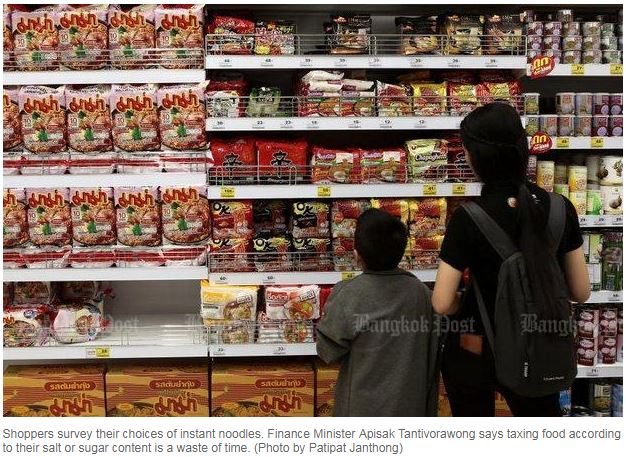Thailand: Finance Minister doubts sodium tax
Finance Minister Apisak Tantivorawong has raised an eyebrow at the Excise Department’s proposed tax on salty foods, saying it is insufficient as written as a lot of effort would be required for the enforcement of a minimal levy amount.
Imposing a tax on foods containing high sodium levels also has a wide impact on consumers, he said.
“I think a tax on salty foods would be a waste. The tax would generate minimal income but would be hated across the country. Moreover, it is difficult to measure sodium levels, unlike for the tax on sugary drinks, which is also a product that has more producers. I would like the Excise Department to explore new taxes and boost tax-collecting efficiency,” he said.
His comment could stymie the Excise Department’s plan to tax high-sodium and trans fat foods. The tax-collecting agency earlier expected the tax will go before the cabinet by year-end as part of efforts to impose levies against products that are harmful to health.
Mr Apisak said the Finance Ministry has no plan to raise any existing taxes, but would improve tax-collecting efficiency and seek new taxes, including an e-business tax to raise the government’s income.
Revenue collection is at 15% of the country’s GDP, whereas revenue collection levels should be 19-20%.
Most recently, the Finance Ministry is developing a tax payment system that will offset tax credits with tax debits, to make the taxation system faster. At present, the tax system is electronic, especially with the Revenue Department, so taxpayers’ credit can be offset against tax returns.
“We would like the tax system to be able to settle credit and debit tax. Even the private sector would like to, although some still view paying taxes as an option. We are working to make the tax system more convenient,” he said.
The government’s revenue collection is on track.
The higher tax revenue collected in the first month of the 2019 fiscal year showed that revenue collection is in line with the economic recovery, he said.
The government amassed net revenue of 206 billion baht in October, an increase of 10.5 billion or 5.3% over the same period last year. The strong revenue collection was attributed to an increase in remittances from state enterprises.
State enterprises in October sent 21.5 billion baht, 62.1% more than a year ago, surpassing the target by 6.14 billion, or 12.3%. The three tax-collecting agencies — the Revenue Department, the Excise Department and the Customs Department — managed to collect 6.54 billion baht or 4.3% above the target in October.
Since the government will require massive spending for big-ticket infrastructure development, the budget deficit will continue for a while, he said.
The government set the annual budget expenditure of 3 trillion baht for fiscal 2019 and revenue collection of 2.55 trillion, leaving a deficit of 450 billion.
According to the Finance Ministry’s recent estimates, budget deficits will be balanced over the next 12 years, when investments for infrastructure projects have been completed.
The government’s hefty investment plan to finance mega-infrastructure projects, particularly the transport system has raised concerns over the budget deficit and public debt.
The government has run a budget deficit since fiscal year 1999, except for in 2005 and 2006.
Source: https://www.bangkokpost.com/business/news/1587042/finance-minister-doubts-sodium-tax


 Thailand
Thailand




